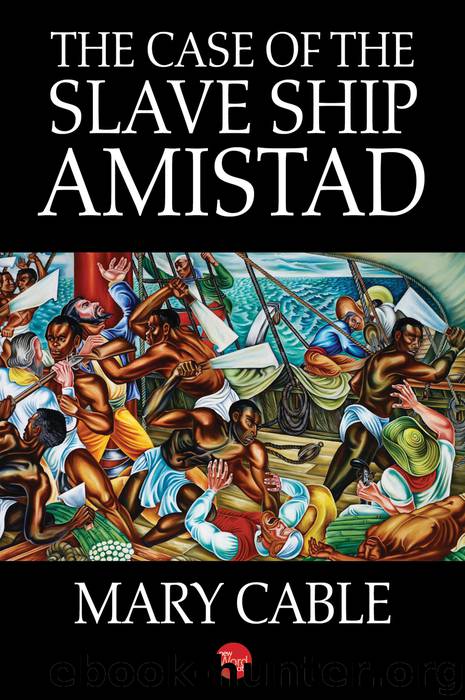The Case of the Slave Ship Amistad by Mary Cable

Author:Mary Cable [Mary Cable]
Language: eng
Format: epub
Tags: History/African American
ISBN: 9781640190917
Publisher: New Word City, Inc.
Published: 2017-08-27T16:00:00+00:00
Kin-na’s letter was along similar lines: “. . . Judge Judson say you be free, but Government say No . . . If man have knife and come to American people and say I kill I eat what America people do? . . . Dear friend Mr. Adams we love you very much we ask we beg you to tell court let Mendi people be free. . . .”
Of the nine Supreme Court justices, only two were at all likely to feel even a slight emotional bias in the Africans’ favor. They were Smith Thompson of New York, who had presided over the Circuit Court at Hartford when the case was first heard, and Joseph Story, of Marblehead and Salem. Both were old men, whose appointments dated from before the Jackson era. Of the others, all but one had been appointed during the Jackson administrations. Chief Justice Roger B. Taney, of Maryland (who, eighteen years later, would read the fateful Dred Scott decision), had been attorney general and secretary of the treasury under Jackson. He was a colonizationist, who had emancipated his own slaves and sent them off to Liberia; he was known to believe that as long as large numbers of blacks remained in the United States, slavery must remain as well.
John McLean, of Ohio, had been postmaster general when Adams was president. Adams considered him “efficient, but treacherous and double-dealing.” He opposed both slavery and abolition. Henry Baldwin, of Pennsylvania, was generally regarded as an eccentric and unpredictable; there were even rumors that he was subject to fits of insanity. James Moore Wayne was a Georgia slaveholder; Philip P. Barbour, of Virginia, was a former Congressman and a strong states-rights man. Adams had once called him “a shallow-pated wildcat.” John Catron, of Tennessee, had served under Jackson in the War of 1812. He was appointed to the bench by Van Buren. The ninth judge, John McKinley, of Alabama, was absent from the capital and therefore did not sit on the Amistad case.
The hearing was scheduled for February 21, but on February 18, Mr. Adams noted in his diary, “a severe visitation of Providence. There was an exhibition at a quarter past eleven, in the front yard of the Capitol, of firing with Colt’s repeating firearms - a new-invented instrument of destruction, for discharging 12 times a musket in as many seconds. I rode to the Capitol with Mr. Smith. We had alighted from the carriage from 5 to 10 minutes when the firing commenced. My carriage was then going out of the yard; the horses took fright, the carriage was jammed against a messenger’s wagon, overset, the pole and a whiffletree broken, the harness nearly demolished; the coachman, Jeremy Leary and the footman, John Causten, precipitated from the box, and Jerry nearly killed on the spot. He was taken into one of the lower rooms of the Capitol, where, as soon as I heard of the disaster, I found him in excruciating torture.”
The coachman died next day. On February 20, Mr.
Download
This site does not store any files on its server. We only index and link to content provided by other sites. Please contact the content providers to delete copyright contents if any and email us, we'll remove relevant links or contents immediately.
| Africa | Americas |
| Arctic & Antarctica | Asia |
| Australia & Oceania | Europe |
| Middle East | Russia |
| United States | World |
| Ancient Civilizations | Military |
| Historical Study & Educational Resources |
Goodbye Paradise(3790)
Men at Arms by Terry Pratchett(2825)
Tobruk by Peter Fitzsimons(2496)
Borders by unknow(2297)
Arabs by Eugene Rogan(2289)
Pirate Alley by Terry McKnight(2207)
More Than Words (Sweet Lady Kisses) by Helen West(1850)
Belonging by Unknown(1843)
It's Our Turn to Eat by Michela Wrong(1711)
The Biafra Story by Frederick Forsyth(1643)
The Source by James A. Michener(1592)
Botswana--Culture Smart! by Michael Main(1584)
A Winter in Arabia by Freya Stark(1524)
Coffee: From Bean to Barista by Robert W. Thurston(1519)
Gandhi by Ramachandra Guha(1517)
The Falls by Unknown(1514)
Livingstone by Tim Jeal(1471)
The Shield and The Sword by Ernle Bradford(1389)
Africa: Altered States, Ordinary Miracles by Richard Dowden(1373)
